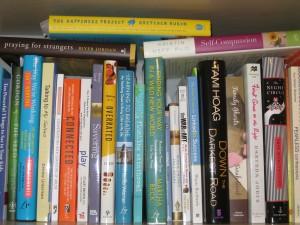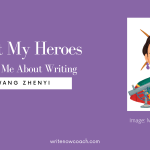Writers Read
If you don’t have time to read, you don’t have the time (or the tools) to write. Simple as that. —Stephen King
On Saturday, I stopped at our local library with a big bag. I spent time reviewing the shelves of new books, paying attention to the book titles and covers that grabbed my attention. I happily stuffed my bag full of the books that caught my imagination, looking forward to three weeks of entertaining new ideas and writers during my reading time.
Writers, the reading life provides the foundation for your writing life. If you want to write anything—nonfiction books, novels, blog posts, articles, or speeches—you need to develop a reading life. Here are a few tips for creating a reading program:
List your interests. What are you curious about? Before you begin to look for reading material, list everything you are interested in learning more about. Are there fields of study that intrigue you? What kinds of ideas inspire you? Are there locations or life situations that you have always wanted to know more about?
Gather reading material! Once you have a list of ideas and subjects you are curious about, you can begin to gather your reading material. When I have written about reading in the past, I have focused solely on books. But with books in flux and so much good information available online, we need to add online sources to our daily reading time. Consider what you would like to read in these areas:
*Newspapers. I have made the New York Times my homepage for many years, making it fairly easy for me to keep up with the paper (at least I see it once a day). Find a newspaper that you like, and make it your homepage or bookmark it.
*Online newsletters. I try to subscribe to a number of newsletters, press release services, and listserves in my areas of interest. This provides me with great new information on a regular basis.
*Blogs. Blogs are an amazing source of information and tools. Use Google Reader or a tool like it to make blog reading easy.
*Periodicals. The library is a great source for reviewing magazines before you commit to a subscription. When you get stuck for ideas or need a brain treat, purchase an interesting magazine for your weekly reading time.
*Books. All of the above resources are a great source of information for great books to read. If you need more ideas, talk to a bookseller or librarian—they are the best read people I know.
Get access! Ever have one of those moments when you have nothing to read? It drives me crazy to be stuck somewhere without the gentle distraction of words. In order to make reading a habit or simply to save your sanity, always have reading material accessible.
*Keep a book or magazine with you at all times. If possible, put a book, periodical, or google reader on your smart phone or iPad, so that you can read even when you forget to take that book with you!
*Always keep a stack of books and periodicals in the bathroom.
*Keep a book in the car (or on your person) for the times you end up waiting.
*Keep a book in the kitchen so you can read while you wait for the water to boil or coffee to brew.
Schedule time to read. Even though I have managed to make reading a priority for 20 years, I still need to schedule time to read. This year, I am planning on adding a reading afternoon to my weekly schedule to keep up with the big shelf of books I want to read (not to mention the magazines, ezines, blogs, and other material). Here are some ways to add a few minutes of reading to your day:
- Get up 30 minutes earlier than your family and use the time for a quiet breakfast and reading.
- Read while you exercise.
- Commute to work and read on the bus or train.
- Read during your lunch hour.
- Take a reading break.
- Set aside 30 minutes at the end of the day to catch up on blog reading or other online reading before you turn off the computer for the day.
- Set aside work time each week to catch up on the reading you do for your profession.
- Replace one hour of email or computer time with reading.
- DVR all television shows—and get back 20 minutes per hour show to read!
- Stop watching television a little earlier (or start watching a little later), and take back an hour or more for reading.
- Dedicate one afternoon (or day) per week (or month) as a reading retreat—and head out to a coffee shop, park, or library to read.
Consider the audio option. Audio books make it possible to “read” while running, driving, cleaning the house, crafting, cooking dinner and more.
Give it time. Reading is a habit that takes time to establish—like exercising and eating well. My final bit of advice will help you ease into it: start with a book that rocks your world. Don’t try to devour War and Peace if you haven’t read anything since college. You’ll just get frustrated. Instead, pick up a book that makes you forget the time. You’ll get hooked. I promise!
















Great tips! I schedule time every day for reading–it is something I love to do, but it is also helpful to me as a writer. I have to say, my favorite of the tips was to DVR televisions shows–I do this with everything I watch, and it definitely affords extra reading time! 🙂
Susi–I am glad to hear you schedule time every day for writing! I need to do more of that! 🙂 Thanks!
Pingback : This week in writing… big banana edition | Knitting with Pencils
Thanks, Rochelle 🙂
I have two stories to share, both true and both actually happened. (A story teller on the air said that all his stories were true, and some of them actually happened.)
En route a ceremony honoring a mutual friend, a church friend and I stopped at my house. My friend said, “Beth, you may come to my house any time. You’re the only person I know who has more magazines in the bathroom than I have.” My husband’s railroad magazines and a gift from my parents of membership in the National Geographic Society provide lots of reading material.
When I first heard the suggestion to keep a Bible in every room in the house, I declined, because I like to keep all my versions handy for proofreading purposes. Then I noticed that I had duplicates of some versions, and I started spreading them around. One day our first full time AFS-son asked a question as he sat at the kitchen table. I no longer remember what he asked, but I reached for the Bible on top of the breadbox, and it supplied the answer. I was glad it was so accessible.
Being a member of a book club gives me reason to read a variety of books, and my asking about them at the school library led the Library Aide to suggest one I really enjoyed and recommended to the book club. The Aide says she likes my lists because they give her suggestions. A book club selection is usually along for reading at lunch time, and yes, I miss it if I forget! I’ve been known to stop at the library en route the lunch room.
A list of classics on a table at work suggested several tomes I haven’t read, and I checked out one from the school library. Someday maybe I’ll finish it, but I turned it in when it was due this time. I found a description I valued enough to copy to a bookmark: “For my part, I abominate all honourable respectable toils, trials, and tribulations of every kind whatsoever.” I think I’d be proud to have my endeavors and experiences on that person’s list of abominations.
The Bible in my car is there because I visited a friend in the hospital whose room wasn’t so equipped, and I determined not to be without a Bible on any future such visit.
I like to read in bed to warm the covers while I’m thinking about something else. When I’m too tired or too sleepy to keep reading, the bedding is warm and cozy to encourage me to curl up and sleep.
Blessings to you in your ministry,
Beth